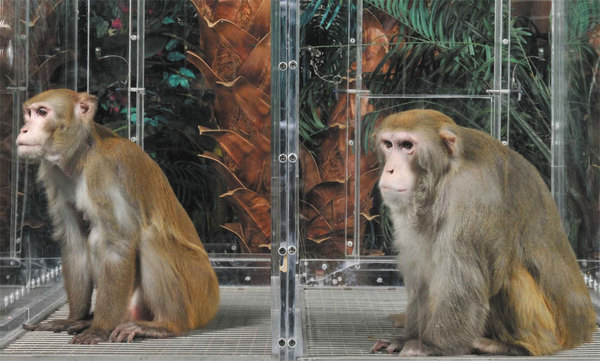Rhesus Monkeys were used to test Caloric Restriction Hypothesis
2012-08-29

Rhesus monkeys on calorie-restricted does not seem to lengthen lifespan.
Credits: National Institute on Aging/ National Institutes of Health
National Institute on Aging (NIA) have found that calorie restriction has no effect on the animals' longevity. In their studies, the rhesus monkeys fed 30% less than control animals for 25 years, and did not seem to lengthen their lifespan. Their results differ from those published in 2009 by NIA-supported investigators at the Wisconsin National Primate Research (WNPRC). WNPRC study compared two groups of rhesus monkeys for 20 years and suggested monkeys on a calorie-restricted diet lived longer than that on a standard diet. NIA scientists inferred that genetics and dietary composition matter may be two main reasons for difference between their results.
For details, refer to the publication:
Impact of caloric restriction on health and survival in rhesus monkeys from the NIA study. Nature (2012) doi:10.1038/nature11432.Julie A. Mattison, George S. Roth, T. Mark Beasley, Edward M. Tilmont, April M. Handy, Richard L. Herbert, Dan L. Longo, David B. Allison, Jennifer E. Young, Mark Bryant, Dennis Barnard, Walter F. Ward, Wenbo Qi, Donald K. Ingram & Rafael de Cabo
Abstract:
Calorie restriction (CR), a reduction of 10-40% in intake of a nutritious diet, is often reported as the most robust non-genetic mechanism to extend lifespan and healthspan. CR is frequently used as a tool to understand mechanisms behind ageing and age-associated diseases. In addition to and independently of increasing lifespan, CR has been reported to delay or prevent the occurrence of many chronic diseases in a variety of animals. Beneficial effects of CR on outcomes such as immune function1, 2, motor coordination3 and resistance to sarcopenia4 in rhesus monkeys have recently been reported. We report here that a CR regimen implemented in young and older age rhesus monkeys at the National Institute on Aging (NIA) has not improved survival outcomes. Our findings contrast with an ongoing study at the Wisconsin National Primate Research Center (WNPRC), which reported improved survival associated with 30% CR initiated in adult rhesus monkeys (7-14 years) 5 and a preliminary report with a small number of CR monkeys6. Over the years, both NIA and WNPRC have extensively documented beneficial health effects of CR in these two apparently parallel studies. The implications of the WNPRC findings were important as they extended CR findings beyond the laboratory rodent and to a long-lived primate. Our study suggests a separation between health effects, morbidity and mortality, and similar to what has been shown in rodents 7, 8, 9, study design, husbandry and diet composition may strongly affect the life-prolonging effect of CR in a long-lived nonhuman primate.



